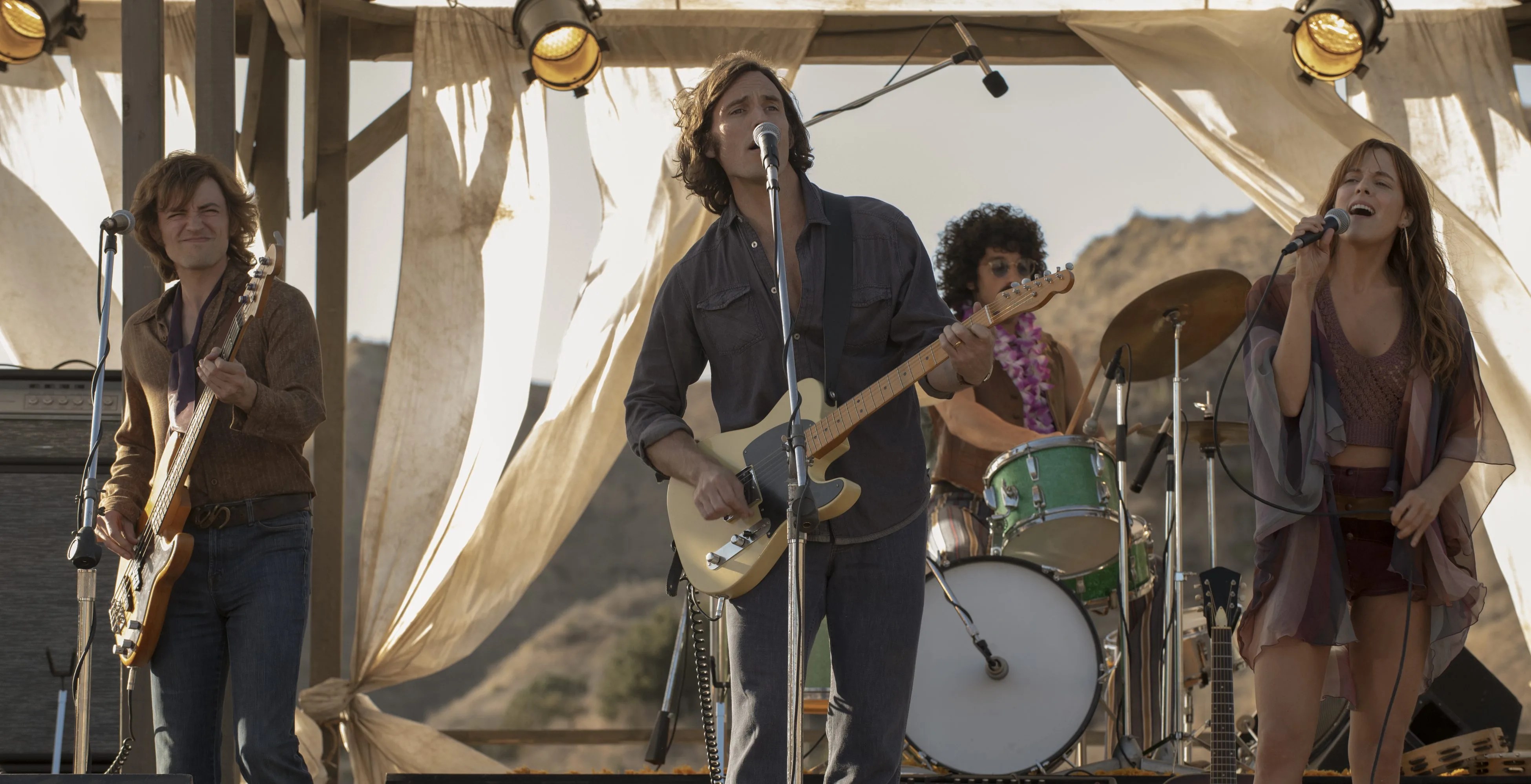As a Musician, There is So Much I Love About ‘Daisy Jones and the Six’
The fact that the actors play their instruments is a great start

One morning, I woke up and suddenly saw Daisy Jones and the Six absolutely everywhere. I knew nothing about it, save for the fact that it took heavy inspiration from the band Fleetwood Mac, as well as the whole “scene” from the 70s in general. It was the sort of thing I would have been all over as a kid, but am now hesitant about. We’re far enough removed from the 70s that romanticization is starting to turn into feckless aestheticization—more about fashion and looks than spirit or grit.
And yet … when I did give Daisy Jones a try, I was surprised by how engrossed I was by it. Being a musician myself, I find that actually good media about music is rare. Too many filmmakers over-idealize the process and don’t show how hard it is to actually get to where you want to be (2013’s Begin Again comes to mind). As well as this, the best moments—the ones where you’re connected with your bandmates, or with the song you’re making—are often overshadowed by overly saccharine “Hollywood” moments. In reality, making music is this very primal, transcendent thing. While I might be in the minority in saying this, I think Daisy Jones and the Six reflected this very well.
A gratifying depiction
Yes, it’s a little unbelievable that the honky-tonk sound of the Six stood out enough to grab a major label player’s attention (we have to suspend our belief, especially given the nature of the original book). But the scenes where the band plays together genuinely made me smile. They clearly went to the effort of making sure that a synergy was at least visually present between band members. I’ve seen and felt this sort of synergy myself. It’s this tangible, electric feeling, like a whole other language being spoken between you and your partners. In other words: really cool shit.
What probably helped elevate this sense of synergy is the fact that the actors genuinely played their instruments. They learned and nailed their parts. Oh, the joy I felt in watching their fingers work their fretboards and actually hearing the correct notes in real time! You have no idea how gratifying that was!
This especially extends to Daisy. It should hopefully come as no surprise that it’s just harder for women to get an equal leg up in the music industry. I have no doubt that it was even harder back then. I personally related to her story, as someone who had to really get scrappy in order to get her foot in the door. You have to have a lot of guts and determination to be your own sort of woman making music. While the payoff is worth it, good god is it a slog getting there.
But she does get there, and even though it’s definitely played up for the sake of television, it was pretty gratifying to watch! We got to see her play and write her own songs, and watch the frustrating process of putting them all together (every time she threw her notebook and shouted obscenities when a song didn’t work resonated with me profoundly). We got to see her own distinct strumming and fingerpicking styles, which I found pretty endearing. She’s got a stiff hand, I let my pinky hang out. It’s all indicative of some sort of style, not something being performed for the sake of television.
The magic and the struggle
And look, sure, there’s still an element of sanitization involved in the depiction of music here. Even when they fail, there’s still an element of hope and hyperbole. Compare that to a movie like Inside Llewyn Davis, which I consider to be one of the best fictional pieces about music about there, and Daisy Jones almost feels too good to be true. All the same, I just couldn’t shake that feeling of familiarity while I watched it. When Daisy walks onto that Oahu stage and makes it her own? I felt that glee. I’ve been there. Performing is a truly special thing that is difficult to properly replicate, so kudos to Riley Keogh and the team for giving those scenes such heartfelt, genuine energy. (Although I gotta say, that was NOT Oahu. How the hell did they get the van off the mainland with what little money they had? where were the Hawaiians/why was the crowd so white? etc.)
Circling back to Llewyn Davis (another work based off the life of a real musician, my beloved Dave Van Ronk), I’ll end by saying that I found these two works to be like opposite sides of the same coin. Being a musician is a tiresome, soul-crushing experience that requires a lot of determination, disappointment, and dicking around. Llewyn gave us all that and then some. And … it’s also full of magic, energy, and connection, which Daisy and the Six continually experience. What both pieces of media have in common is that tangible feeling that comes with genuinely being in love with your musicianship. Llewyn, despite his many woes and exhaustion, is shown to be cursed with his love for music for the rest of his life. And we’ve already covered the musical threads that bind Daisy and the Six together.
I don’t care if it’s a little campy. I’m loving the feelings that Daisy Jones and the Six are bringing out of me. If you’re a musician too, let me know your thoughts in the comments—whether we had similar experiences or not!
(Featured Image: Amazon)
Have a tip we should know? tips@themarysue.com